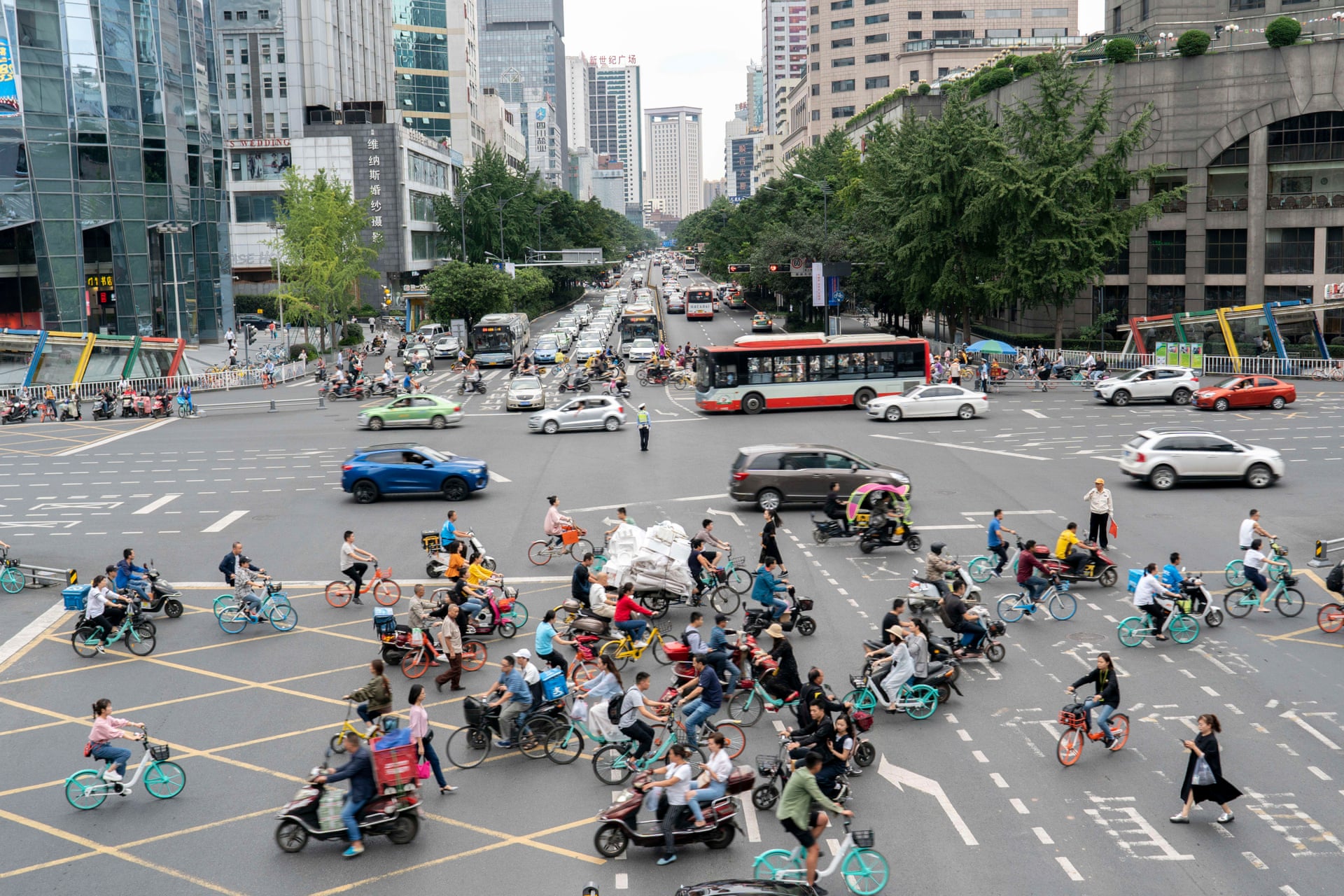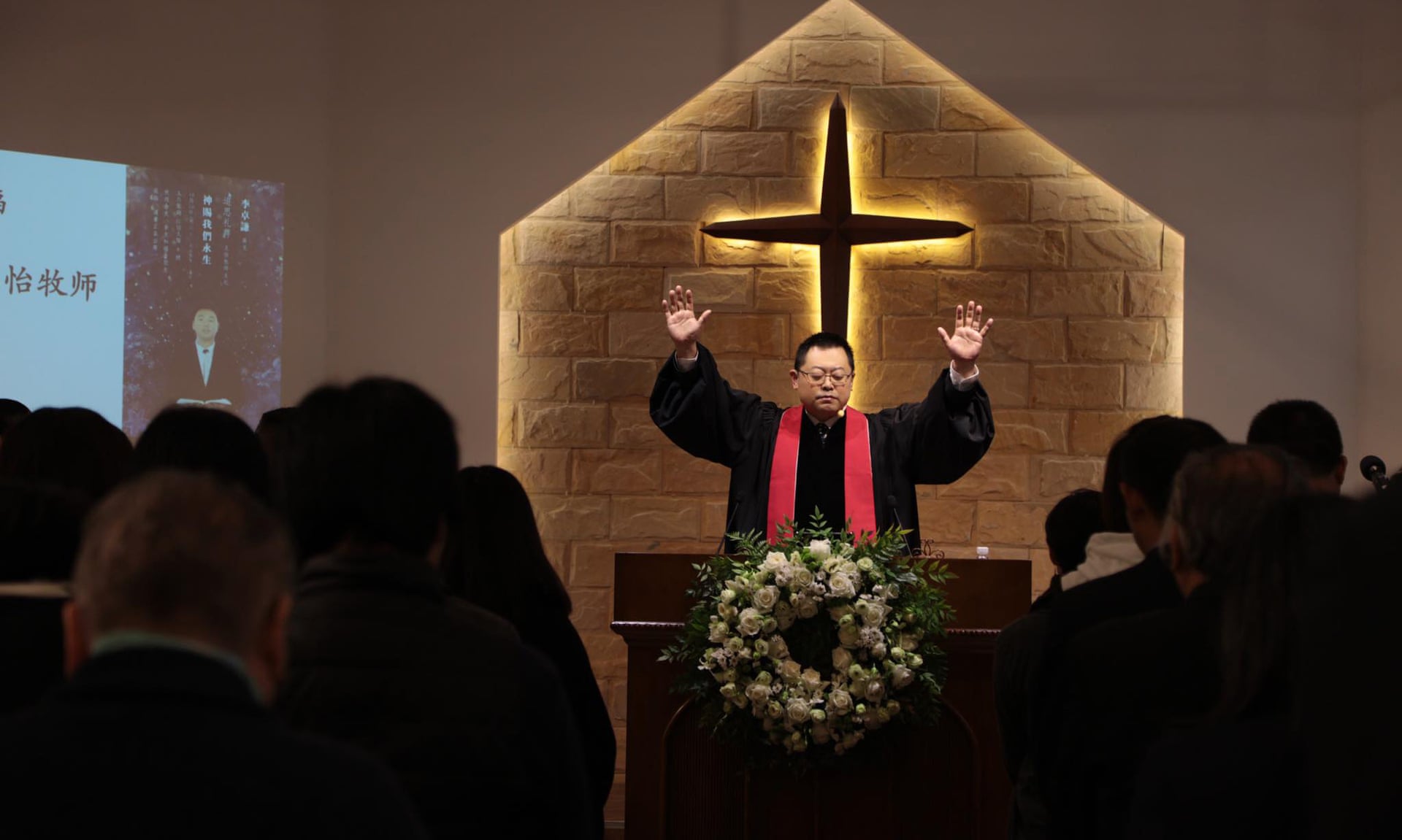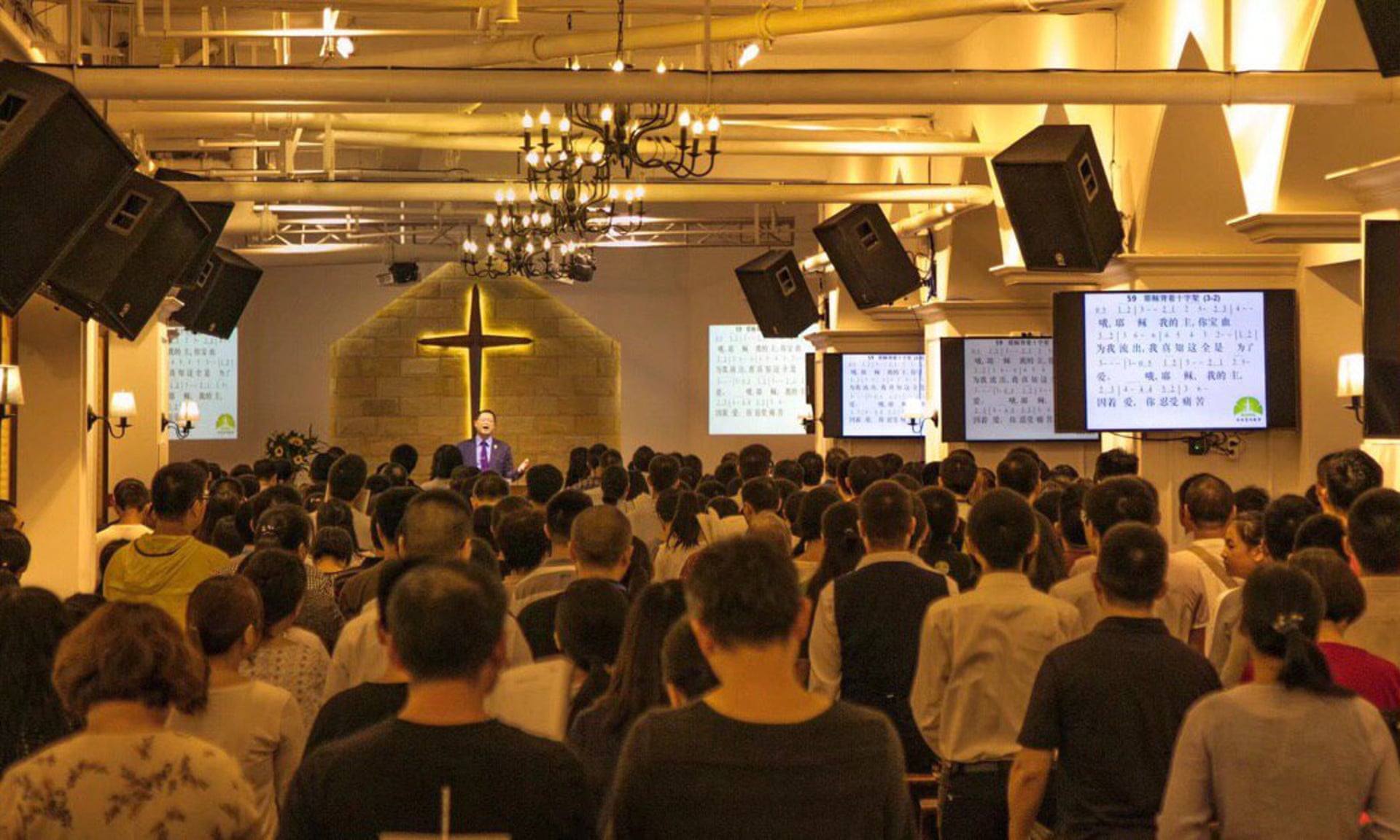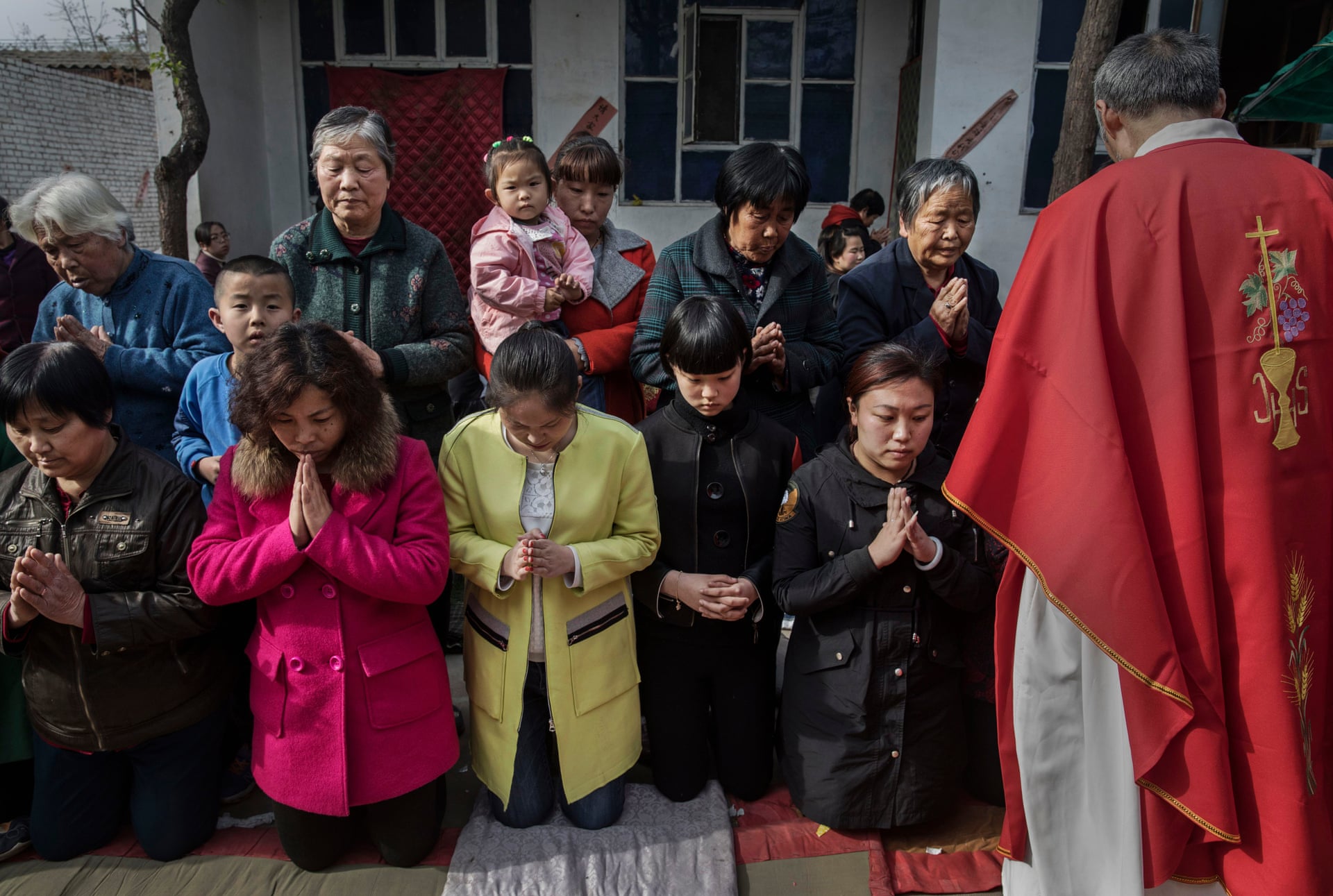By Lily Kuo in Chengdu
 Rush hour in the centre of Chengdu, home to the Early Rain Covenant Church, which has just been closed.
Rush hour in the centre of Chengdu, home to the Early Rain Covenant Church, which has just been closed.
In late October, the pastor of one of China’s best-known underground churches asked this of his congregation: had they successfully spread the gospel throughout their city?
Wang Yi, pastor of the Early Rain church, who was arrested and detained three months ago, along with his wife.
Early Rain is the latest victim of what Chinese Christians and rights activists say is the worst crackdown on religion since the country’s Cultural Revolution, when Mao Zedong’s government vowed to eradicate religion.
Researchers say the current drive, fuelled by government unease over the growing number of Christians and their potential links to the west, is aimed not so much at destroying Christianity but bringing it to heel.
“The government has orchestrated a campaign to ‘sinicise’ Christianity, to turn Christianity into a fully domesticated religion that would do the bidding of the party,” said Lian Xi, a professor at Duke University in North Carolina, who focuses on Christianity in modern China.
Over the past year, local governments have shut hundreds of unofficial congregations or “house churches” that operate outside the government-approved church network, including Early Rain.
Catholics wait to take communion during the Palm Sunday mass at a ‘house church’ near Shijiazhuang.
As of 2018, the government has implemented sweeping rules on religious practices, adding more requirements for religious groups and barring unapproved organisations from engaging in any religious activity.
 Rush hour in the centre of Chengdu, home to the Early Rain Covenant Church, which has just been closed.
Rush hour in the centre of Chengdu, home to the Early Rain Covenant Church, which has just been closed. In late October, the pastor of one of China’s best-known underground churches asked this of his congregation: had they successfully spread the gospel throughout their city?
“If tomorrow morning the Early Rain Covenant Church suddenly disappeared from the city of Chengdu, if each of us vanished into thin air, would this city be any different? Would anyone miss us?” said Wang Yi, leaning over his pulpit and pausing to let the question weigh on his audience.
“I don’t know.”
Almost three months later, Wang’s hypothetical scenario is being put to the test.
Almost three months later, Wang’s hypothetical scenario is being put to the test.
The church in south-west China has been shuttered and Wang and his wife, Jiang Rong, remain in detention after police arrested more than 100 Early Rain church members in December.
Many of those who haven’t been detained are in hiding.
Others have been sent away from Chengdu and barred from returning.
Some, including Wang’s mother and his young son, are under close surveillance.
Wang and his wife are being charged for “inciting subversion”, a crime that carries a penalty of up to 15 years in prison.
Now the hall Wang preached from sits empty, the pulpit and cross that once hung behind him both gone.
Now the hall Wang preached from sits empty, the pulpit and cross that once hung behind him both gone.
Prayer cushions have been replaced by a ping-pong table and a film of dust.
New tenants, a construction company and a business association, occupy the three floors the church once rented.
Plainclothes police stand outside, turning away those looking for the church.
One of the officers told the Observer: “I have to tell you to leave and watch until you get in a car and go.”
One of the officers told the Observer: “I have to tell you to leave and watch until you get in a car and go.”
Wang Yi, pastor of the Early Rain church, who was arrested and detained three months ago, along with his wife.
Early Rain is the latest victim of what Chinese Christians and rights activists say is the worst crackdown on religion since the country’s Cultural Revolution, when Mao Zedong’s government vowed to eradicate religion.
Researchers say the current drive, fuelled by government unease over the growing number of Christians and their potential links to the west, is aimed not so much at destroying Christianity but bringing it to heel.
“The government has orchestrated a campaign to ‘sinicise’ Christianity, to turn Christianity into a fully domesticated religion that would do the bidding of the party,” said Lian Xi, a professor at Duke University in North Carolina, who focuses on Christianity in modern China.
Over the past year, local governments have shut hundreds of unofficial congregations or “house churches” that operate outside the government-approved church network, including Early Rain.
A statement signed by 500 house church leaders in November says authorities have removed crosses from buildings, forced churches to hang the Chinese flag and sing patriotic songs, and barred minors from attending.
Churchgoers say the situation will get worse as the campaign reaches more of the country.
Churchgoers say the situation will get worse as the campaign reaches more of the country.
Another church in Chengdu was placed under investigation last week.
Less than a week after the mass arrest of Early Rain members, police raided a children’s Sunday school at a church in Guangzhou.
Officials have also banned the 1,500-member Zion church in Beijing after its pastor refused to install CCTV.
In November the Guangzhou Bible Reformed Church was shut for the second time in three months. “The Chinese Communist party (CCP) wants to be the God of China and the Chinese people.
In November the Guangzhou Bible Reformed Church was shut for the second time in three months. “The Chinese Communist party (CCP) wants to be the God of China and the Chinese people.
But according to the Bible only God is God. The government is scared of the churches,” said Huang Xiaoning, the church’s pastor.
Local governments have also shut the state-approved “sanzi” churches.
Local governments have also shut the state-approved “sanzi” churches.
Sunday schools and youth ministries have been banned.
One of the first signs of a crackdown was when authorities forcibly removed more than 1,000 crosses from sanzi churches in Zhejiang province between 2014 and 2016.
“The goal of the crackdown is not to eradicate religions,” said Ying Fuk Tsang, director of the Christian Study Centre on Chinese Religion and Culture at the Chinese University of Hong Kong. “Xi Jinping is trying to establish a new order on religion, suppressing its blistering development. [The government] aims to regulate the ‘religious market’ as a whole.”
While the CCP is officially atheist, Protestantism and Catholicism are two of five faiths sanctioned by the government and religious freedom has been enshrined in the constitution since the 1980s.
“The goal of the crackdown is not to eradicate religions,” said Ying Fuk Tsang, director of the Christian Study Centre on Chinese Religion and Culture at the Chinese University of Hong Kong. “Xi Jinping is trying to establish a new order on religion, suppressing its blistering development. [The government] aims to regulate the ‘religious market’ as a whole.”
While the CCP is officially atheist, Protestantism and Catholicism are two of five faiths sanctioned by the government and religious freedom has been enshrined in the constitution since the 1980s.
For decades, authorities tolerated the house churches, which refused to register with government bodies that required church leaders to adapt teachings to follow party doctrine.
Members of the Early Rain Covenant Church pray during a meeting in their church before it was shut down in December 2018.
As China experienced an explosion in the number of religious believers, the government has grown wary of Christianity and Islam in particular, with their overseas links.
As China experienced an explosion in the number of religious believers, the government has grown wary of Christianity and Islam in particular, with their overseas links.
In East Turkestan, a surveillance and internment system has been built for Muslim minorities, notably the Uighurs.
Xi has called for the country to guard against “infiltration” through religion and extremist ideology.
“What happens in East Turkestan and what happens to house churches is connected,” said Eva Pils, a professor of law at King’s College London, focusing on human rights.
Xi has called for the country to guard against “infiltration” through religion and extremist ideology.
“What happens in East Turkestan and what happens to house churches is connected,” said Eva Pils, a professor of law at King’s College London, focusing on human rights.
“Those kinds of new attitudes have translated into different types of measures against Christians, which amount to intensified persecution of religious groups.”
There are at least 60 million Christians in China, spanning rural and urban areas.
There are at least 60 million Christians in China, spanning rural and urban areas.
Congregation-based churches can organise large groups across the country and some have links with Christian groups abroad.
Pastors such as Wang of Early Rain are especially alarming for authorities.
Pastors such as Wang of Early Rain are especially alarming for authorities.
Under Wang, a legal scholar and public intellectual, the church has advocated for parents of children killed in the 2008 Sichuan earthquake – deaths caused by poor government-run construction – or for families of those affected by faulty vaccines.
Every year the church commemorates victims of the 4 June protests in 1989, which were forcibly put down by the Chinese military.
“Early Rain church is one of the few who dare to face what is wrong in society,” said one member. “Most churches don’t dare talk about this, but we obey strictly obey the Bible, and we don’t avoid anything.”
Wang and Early Rain belong to what some see as a new generation of Christians that has emerged alongside a growing civil rights movement.
“Early Rain church is one of the few who dare to face what is wrong in society,” said one member. “Most churches don’t dare talk about this, but we obey strictly obey the Bible, and we don’t avoid anything.”
Wang and Early Rain belong to what some see as a new generation of Christians that has emerged alongside a growing civil rights movement.
Increasingly, activist church leaders have taken inspiration from the democratising role the church played in eastern European countries in the Soviet bloc or South Korea under martial law, according to Lian.
Several of China’s most active human rights lawyers are Christians.
“They have come to see the political potential of Christianity as a force for change,” said Lian.
“They have come to see the political potential of Christianity as a force for change,” said Lian.
“What really makes the government nervous is Christianity’s claim to universal rights and values.”
Catholics wait to take communion during the Palm Sunday mass at a ‘house church’ near Shijiazhuang.
As of 2018, the government has implemented sweeping rules on religious practices, adding more requirements for religious groups and barring unapproved organisations from engaging in any religious activity.
But the campaign is not just about managing behaviour.
One of the goals of a government work plan for “promoting Chinese Christianity” between 2018 and 2022 is “thought reform”.
The plan calls for “retranslating and annotating” the Bible, to find commonalities with socialism and establish a “correct understanding” of the text.
“Ten years ago, we used to be able to say the party was not really interested in what people believed internally,” said Pils.
“Ten years ago, we used to be able to say the party was not really interested in what people believed internally,” said Pils.
“Xi Jinping’s response is much more invasive and it is in some ways returning to Mao-era attempts to control hearts and minds.”
Bibles, sales of which have always been controlled in China, are no longer available for purchase online, a loophole that had existed for years.
Bibles, sales of which have always been controlled in China, are no longer available for purchase online, a loophole that had existed for years.
In December, Christmas celebrations were banned in several schools and cities across China.
“Last year’s crackdown is the worst in three decades,” said Bob Fu, the founder of ChinaAid, a Christian advocacy group based in the US.
In Chengdu, Early Rain has not vanished.
“Last year’s crackdown is the worst in three decades,” said Bob Fu, the founder of ChinaAid, a Christian advocacy group based in the US.
In Chengdu, Early Rain has not vanished.
Before the raid, a plan was in place to preserve the church, with those who were not arrested expected to keep it running, holding meetings wherever they could.
Slowly, more Early Rain members are being released.
As of 9 January, 25 were still in detention.
They maintain contact through encrypted platforms.
They maintain contact through encrypted platforms.
On New Year’s Eve, 300 people joined an online service, some from their homes, others from cars or workplaces, to pray for 2019.
Others gather in small groups in restaurants and parks.
One member, a student who was sent back to Guangzhou, said he preaches the gospel to the police who monitor him.
The church continues to send out daily scripture and posts videos of sermons.
The church continues to send out daily scripture and posts videos of sermons.
In one, pastor Wang alludes to the coming crackdown: “In this war, in East Turkestan, in Shanghai, in Beijing, in Chengdu, the rulers have chosen an enemy that can never be imprisoned – the soul of man. Therefore they are doomed to lose this war.”








